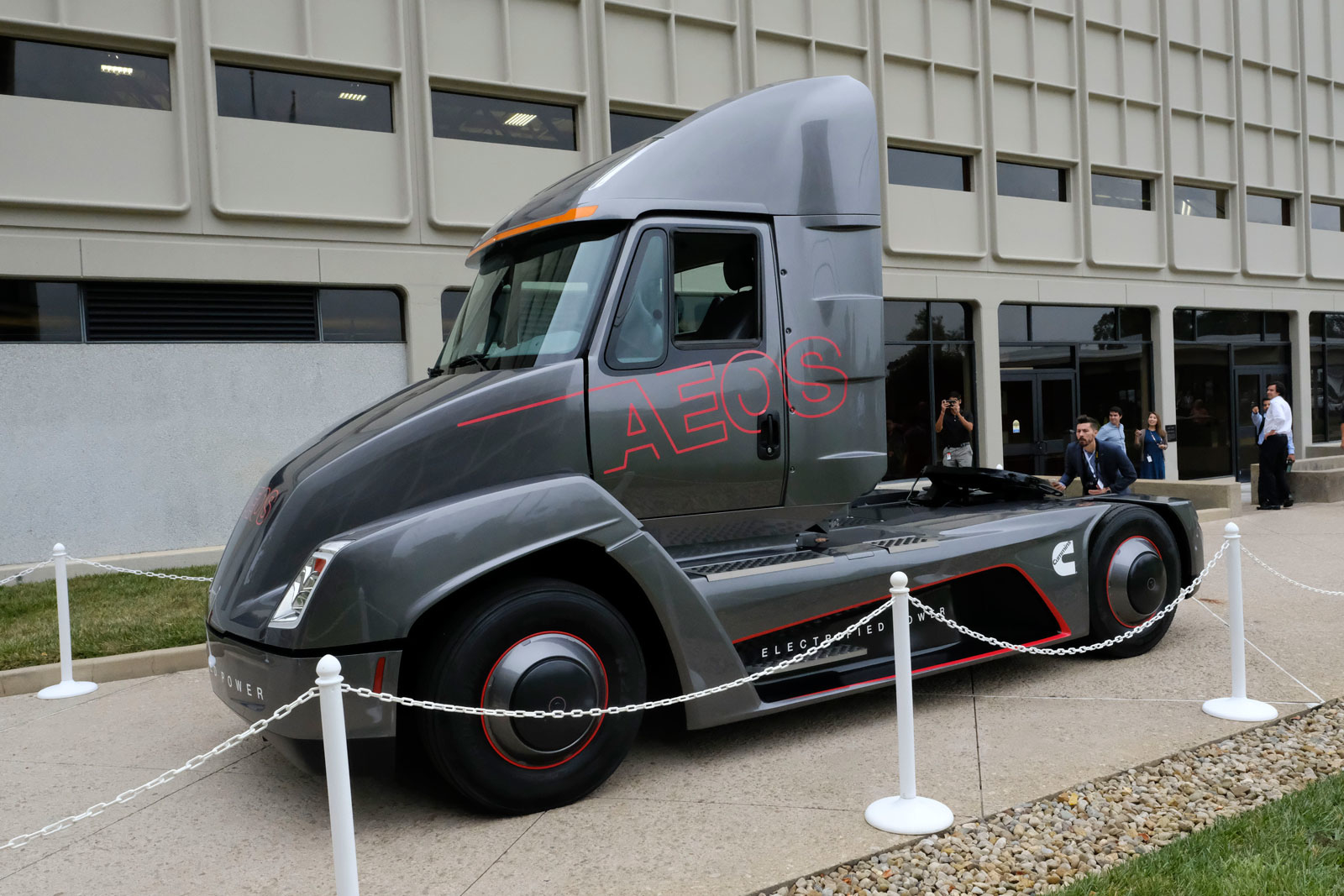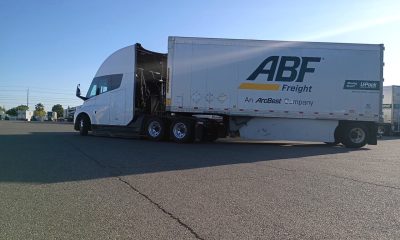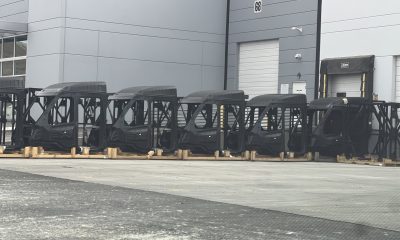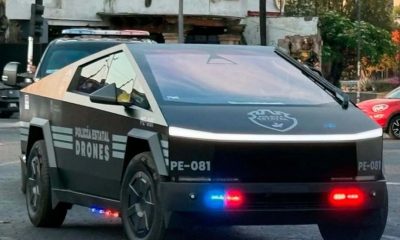

News
Tesla Semi competition with 140 kWh battery emerges before reveal event, Tesla co-founder weighs in
This Article first appeared on:
Less than a month away from the Tesla Semi reveal event, competitors are emerging to challenge the Elon Musk-led company on its first foray into the commercial trucking sector. After witnessing Tesla’s wildly successful entrance into the passenger vehicle space, existing players in the trucking industry have already realized the potential disruption Tesla could bring in their own backyard.
Just yesterday, Cummins, a massive $27 billion truck manufacturer, announced they have built an electric truck that they plan to mass produce in the next two years. The electric truck carries a 140 kWh battery pack and fast-charging technology. The 140 kWh pack will allow the vehicle to travel up to 100 miles on a single charge and capable of recharging to full capacity in approximately one hour. Cummins also plans to include a range extender to raise the overall range to 300 miles. Similar to Tesla who recently announced that their all-electric truck will have between 200 to 300 miles of range, Cummins is mainly targeting short-haul trucking needs.
Tesla CEO Elon Musk first shared his plans in July 2016 when he announced the company’s plans to shake the trucking industry to its roots. And it was revealed earlier this month that Tesla has begun testing “platooning” technology to increase battery range. Platooning would allow the trucks to drive autonomously and close together to reduce aerodynamic drag.
But in order for platooning to work effectively, the trucks must be able to safely navigate the dense interstates in close proximity, with little to no risk towards other vehicles. Like most things, that is easier said than done. To understand the feasibility of platooning and electric heavy duty trucks, we spoke to one of the leaders in the industry, Wrightspeed.
If Wrightspeed sounds familiar, its probably because you’ve heard of its founder, Ian Wright. Ian was one of the co-founders of Tesla in 2003 and left the company in 2005 to pursue the commercial vehicle industry. Since then, Wrightspeed has designed and manufactured several different hybrid electric powertrains for buses, garbage trucks, and delivery vehicles.
Forget Platooning, Road-Trains are Coming
Here’s what Ian Wright had to say about Platooning and how he plans to tackle this issue.
“Why don’t you pull two of three trailers with one tractor, that would be a lot more efficient than platooning.” – Ian Wright, CEO and Founder of Wrightspeed.
 While Wrightspeed isn’t ready to start producing a powertrain for a hybrid electric truck, they are looking at the market seriously. The company believes that in order to maximize savings for trucking operators, their still needs to be a range extender in trucks, at least until batteries are more dense. You can listen to the full interview with Ian Wright in Episode 2 on September 13th on the NextMobility podcast.
While Wrightspeed isn’t ready to start producing a powertrain for a hybrid electric truck, they are looking at the market seriously. The company believes that in order to maximize savings for trucking operators, their still needs to be a range extender in trucks, at least until batteries are more dense. You can listen to the full interview with Ian Wright in Episode 2 on September 13th on the NextMobility podcast.
The first episode premieres next Wednesday.
To stay on top of the latest developments in AI and autonomous technology, with special guests from industry experts, be sure to subscribe to the NextMobility podcast available on iTunes.
News
Tesla begins Robotaxi certification push in Arizona: report
Tesla seems serious about expanding its Robotaxi service to several states in the coming months.

Tesla has initiated discussions with Arizona transportation regulators to certify its driverless Robotaxi service in the state, as per a recent report from Bloomberg News. The move follows Tesla’s launch of its Robotaxi pilot program in Austin, Texas, as well as CEO Elon Musk’s recent comments about the service’s expansion in the Bay Area.
The Arizona Department of Transportation confirmed to Bloomberg that Tesla has reached out to begin the certification process for autonomous ride-sharing operations in the state. While details remain limited, the outreach suggests that Tesla is serious about expanding its driverless Robotaxi service to several territories in the coming months.
The Arizona development comes as Tesla prepares to expand its service area in Austin this weekend, as per CEO Elon Musk in a post on X. Musk also stated that Tesla is targeting the San Francisco Bay Area as its next major market, with a potential launch “in a month or two,” pending regulatory approvals.
Tesla first launched its autonomous ride-hailing program on June 22 in Austin with a small fleet of Model Y vehicles, accompanied by a Tesla employee in the passenger seat to monitor safety. While still classified as a test, Musk has said the program will expand to about 1,000 vehicles in the coming months. Tesla will later upgrade its Robotaxi fleet with the Cyercab, a two-seater that is designed without a steering wheel.
Sightings of Cybercab castings around the Giga Texas complex suggests that Tesla may be ramping the initial trial production of the self-driving two-seater. Tesla, for its part, has noted in the past that volume production of the Cybercab is expected to start sometime next year.
In California, Tesla has already applied for a transportation charter-party carrier permit from the state’s Public Utilities Commission. The company is reportedly taking a phased approach to operating in California, with the Robotaxi service starting with pre-arranged rides for employees in vehicles with safety drivers.
News
Tesla sets November 6 date for 2025 Annual Shareholder Meeting
The automaker announced the date on Thursday in a Form 8-K.

Tesla has scheduled its 2025 annual shareholder meeting for November 6, addressing investor concerns that the company was nearing a legal deadline to hold the event.
The automaker announced the date on Thursday in a Form 8-K submitted to the United States Securities and Exchange Commission (SEC). The company also listed a new proposal submission deadline of July 31 for items to be included in the proxy statement.
Tesla’s announcement followed calls from a group of 27 shareholders, including the leaders of large public pension funds, which urged Tesla’s board to formally set the meeting date, as noted in a report from The Wall Street Journal.
The group noted that under Texas law, where Tesla is now incorporated, companies must hold annual meetings within 13 months of the last one if requested by shareholders. Tesla’s previous annual shareholder meeting was held on June 13, 2024, which placed the July 13 deadline in focus.
Tesla originally stated in its 2024 annual report that it would file its proxy statement by the end of April. However, an amended filing on April 30 indicated that the Board of Directors had not yet finalized a meeting date, at least at the time.
The April filing also confirmed that Tesla’s board had formed a special committee to evaluate certain matters related to CEO Elon Musk’s compensation plan. Musk’s CEO performance award remains at the center of a lengthy legal dispute in Delaware, Tesla’s former state of incorporation.
Due to the aftermath of Musk’s legal dispute about his compensation plan in Delaware, he has not been paid for his work at Tesla for several years. Musk, for his part, has noted that he is more concerned about his voting stake in Tesla than his actual salary.
At last year’s annual meeting, TSLA shareholders voted to reapprove Elon Musk’s compensation plan and ratified Tesla’s decision to relocate its legal domicile from Delaware to Texas.
Elon Musk
Grok coming to Tesla vehicles next week “at the latest:” Elon Musk
Grok’s rollout to Tesla vehicles is expected to begin next week at the latest.

Elon Musk announced on Thursday that Grok, the large language model developed by his startup xAI, will soon be available in Tesla vehicles. Grok’s rollout to Tesla vehicles is expected to begin next week at the latest, further deepening the ties between the two Elon Musk-led companies.
Tesla–xAI synergy
Musk confirmed the news on X shortly after livestreaming the release of Grok 4, xAI’s latest large language model. “Grok is coming to Tesla vehicles very soon. Next week at the latest,” Musk wrote in a post on social media platform X.
During the livestream, Musk and several members of the xAI team highlighted several upgrades to Grok 4’s voice capabilities and performance metrics, positioning the LLM as competitive with top-tier models from OpenAI and Google.
The in-vehicle integration of Grok marks a new chapter in Tesla’s AI development. While Tesla has long relied on in-house systems for autonomous driving and energy optimization, Grok’s integration would introduce conversational AI directly into its vehicles’ user experience. This integration could potentially improve customer interaction inside Tesla vehicles.
xAI and Tesla’s collaborative footprint
Grok’s upcoming rollout to Tesla vehicles adds to a growing business relationship between Tesla and xAI. Earlier this year, Tesla disclosed that it generated $198.3 million in revenue from commercial, consulting, and support agreements with xAI, as noted in a report from Bloomberg News. A large portion of that amount, however, came from the sale of Megapack energy storage systems to the artificial intelligence startup.
In July 2023, Musk polled X users about whether Tesla should invest $5 billion in xAI. While no formal investment has been made so far, 68% of poll participants voted yes, and Musk has since stated that the idea would be discussed with Tesla’s board.
-

 Elon Musk1 week ago
Elon Musk1 week agoTesla investors will be shocked by Jim Cramer’s latest assessment
-

 Elon Musk3 days ago
Elon Musk3 days agoElon Musk confirms Grok 4 launch on July 9 with livestream event
-

 Elon Musk14 hours ago
Elon Musk14 hours agoxAI launches Grok 4 with new $300/month SuperGrok Heavy subscription
-

 News7 days ago
News7 days agoTesla Model 3 ranks as the safest new car in Europe for 2025, per Euro NCAP tests
-

 Elon Musk2 weeks ago
Elon Musk2 weeks agoA Tesla just delivered itself to a customer autonomously, Elon Musk confirms
-

 Elon Musk1 week ago
Elon Musk1 week agoxAI’s Memphis data center receives air permit despite community criticism
-

 Elon Musk2 weeks ago
Elon Musk2 weeks agoTesla’s Omead Afshar, known as Elon Musk’s right-hand man, leaves company: reports
-

 News2 weeks ago
News2 weeks agoXiaomi CEO congratulates Tesla on first FSD delivery: “We have to continue learning!”





















